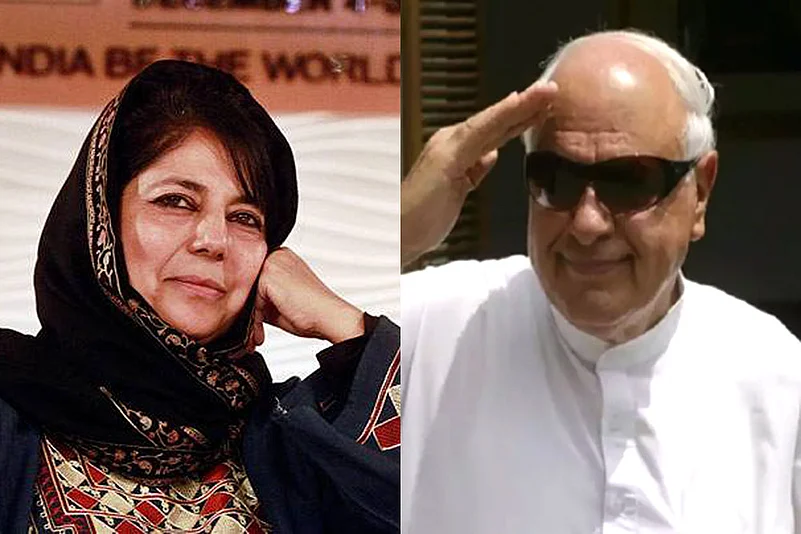As the Supreme Court Tuesday said Article 370 of the Constitution, which gives special status on Jammu and Kashmir and limits the Central government's power to make laws for the state, had acquired permanent status through years of existence, making its abrogation impossible, the Chief Minister Mehbooba Mufti and opposition National Conference patron Farooq Abdullah welcomed the observations.
“While Article 370 safeguards the territorial integrity of J & K, it plays a bigger role safeguarding the religious, cultural & linguistic integrity of our state. The Hon’ble Supreme Court’s observation regarding its permanent status is a welcome assurance to our people,” the Chief Minister tweeted.
The SC observation came from a bench of Justices Adarsh K Goel and R F Nariman in response to a petition by Kumari Vijayalakshmi Jha. Jha had sought a declaration that Article 370 was a temporary provision and it lapsed with the dissolution of the J&K Constituent Assembly on January 26, 1957. Jha had also sought an assertion that the constitution of J&K was void, inoperative and in breach of the Constitution.
PDP senior leader MLA Nizamuddin Bhat said that the ruling from country's highest constitutional forum comes as a greater relief as, “in our opinion, it commands the national opinion to bind the establishment and political dispensations not to fiddle with it in any circumstances.”
"The decision does more to sense the national consensus on respecting the constitution as it values the significance of the Special Status granted to Jammu and Kashmir."
“The decision also binds parliament to maintain the sanctity of the constitution, though by implication and one can safely presume that law and state is firmly behind the constitutional position enshrined in the Article 370.”
He said while the debate on status quo vis-a-vis the constitutional framework should end in the wake of Supreme Court's adjudication, the debate on the political issue regarding the state as well as restoring Article 370 to its original form will remain.
Bhat said while PDP will not claim any credit for ensuring from a party like BJP in the document for agenda of an alliance that Article 370 will not be abrogated or undermined, the decision from country's apex court comes as a short in the arm. He said he hoped that taking into account the prevailing situation in the state central government will become more active in gaining the trust of the people of the state by a meaningful reach out.
Dr Farooq Abdullah also described the SC observation as “very good.” “The Court said the Article 370 is permanent and it is very good. They should restore the autonomy.”
Meanwhile, all the petitions challenging Article 35-A, which gives special rights and privileges to the permanent residents of Jammu and Kashmir have been clubbed for hearing by the Supreme Court on April 9.
The petitions challenging Article 35-A have been filed by We The Citizens-an NGO, Charu Wali Khanna and Dr Seema Razdan, West Pakistan Refugees Action Committee.
Their plea says the state government, under the guise of Article 35(A), which grants special status to the state, has been discriminating against non-residents who are debarred from buying properties, getting a government job or voting in the local elections.
On October 30, a three-judge bench comprising Chief Justice of India Dipak Mishra, Justice Ajay Manikrao Khanwikar and Justice DY Chandrachud had deferred the hearing of petitions by three months following the submission by the Attorney General, KK Venugopal that the court proceedings would hamper the dialogue initiated by the centre’s interlocutor Dineshwar Sharma.
Last year, when the petitions were filed, Chief minister Mehbooba Mufti had met Union home minister Rajnath Singh and Prime Minister Narendra Modi to convey her concern as the attorney general of India did not file any counter-petition against the petitions challenging Article 35(A).
The chief minister, ahead of meeting PM Modi in New Delhi on July 28 last year, had argued that the people of Jammu and Kashmir, despite being a Muslim majority, decided to accede to India and they rejected the two-nation theory and Pakistan.
Mufti had said there would be no one to “hoist the tri-colour” in Jammu and Kashmir if Article 35(A) is tinkered with. "On one hand, we talk of resolving the Kashmir issue under the framework of the Constitution, on the other hand, we flog it. Who is doing it? Why are they doing it?” she had asked, referring to those who are filing petitions against the Article 35(A) and the Article 370.
Mufti also said: "Let me be very clear. By doing this (challenging the Article 35A), you are not targeting the separatists. Their (separatists) agenda is different, and it is secessionist. But, you are weakening those powers which are Indian and not only trust India but also participate in elections, and who fight to live a life honourably in Jammu and Kashmir.”
The opposition leader Omar Abdullah previously has said separatist leaders have no business with about the Article 35(A) as they don’t believe in Indian Constitution. In fact, Abdullah has held campaigns in Jammu warning people that if the Article 35(A) is struck down, it will adversely impact Jammu and Ladakh regions.
















